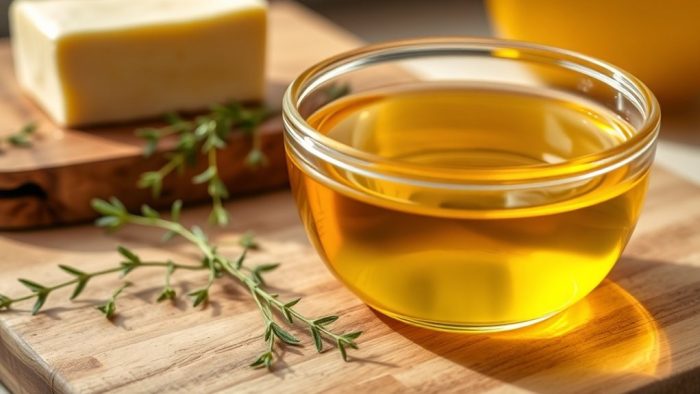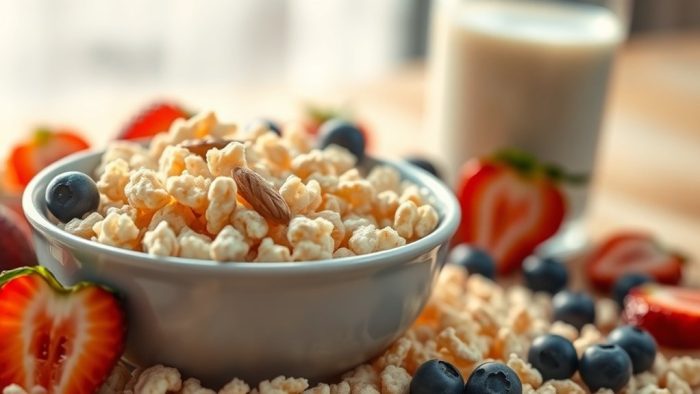What Do Cats Eat Veg
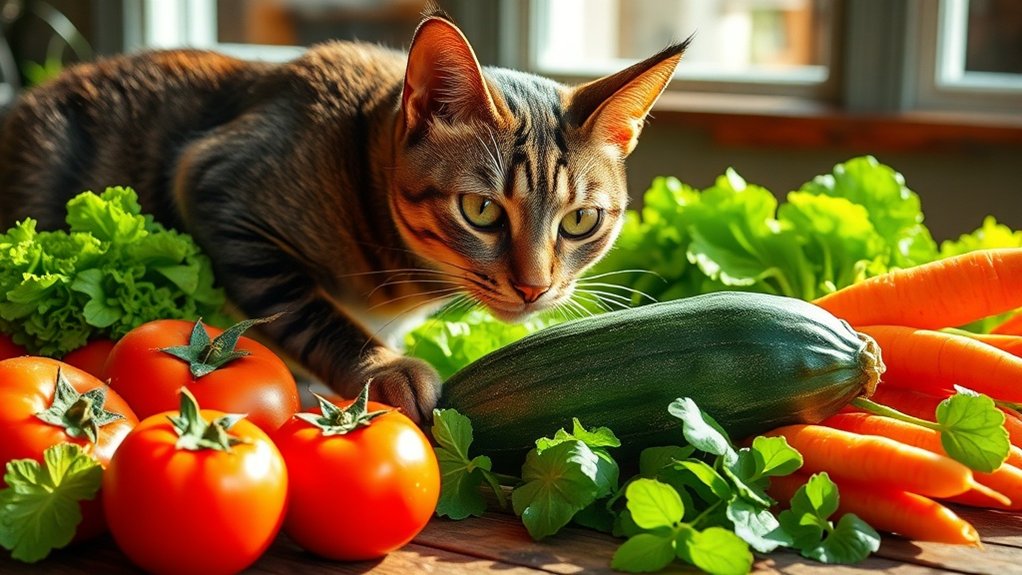
Your cat can eat small amounts of certain vegetables like steamed broccoli, carrots, or green beans as occasional treats, but they shouldn’t exceed 10% of daily caloric intake. As obligate carnivores, cats lack the digestive enzymes to efficiently process plant material and require animal-derived nutrients like taurine and arachidonic acid for survival. Some vegetables—including onions, garlic, and raw potatoes—are toxic and can cause hemolytic anemia or organ damage. Understanding which vegetables are safe and the critical limitations of plant-based nutrition will help you make informed decisions about your cat’s dietary needs.
Understanding Cats as Obligate Carnivores
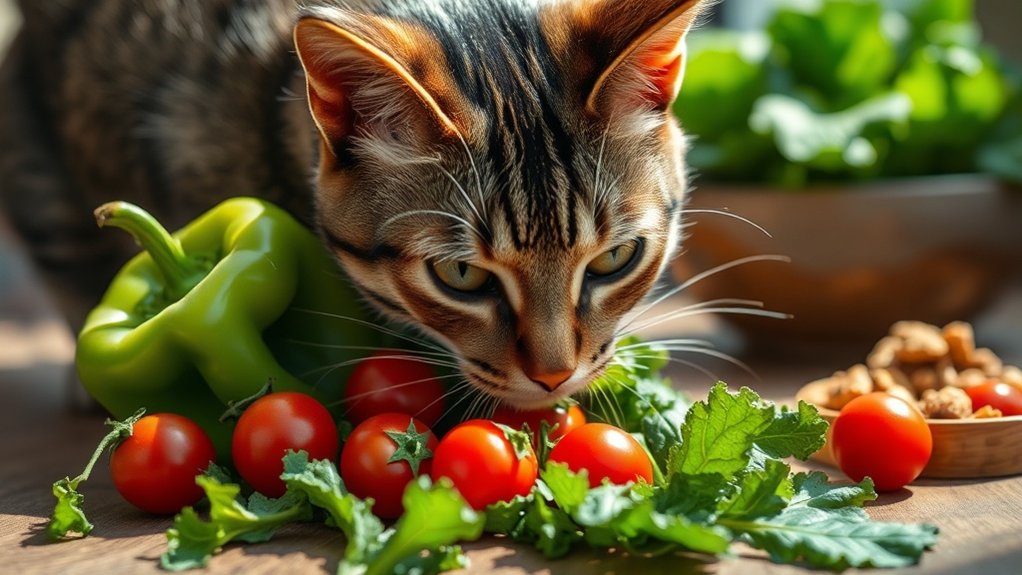
Because cats evolved as strict predators, they’re physiologically classified as obligate carnivores—organisms that require animal tissue to survive.
Your cat’s nutritional needs center on animal-based proteins containing essential nutrients like taurine and arachidonic acid, which aren’t adequately available in a plant-based diet.
Unlike omnivores, cats lack specific digestive enzymes needed to efficiently process plant material, limiting nutrient extraction from vegetables.
While some vegetables are safe to feed as occasional treats, they shouldn’t exceed 10% of your cat’s daily caloric intake to prevent digestive issues.
High-quality commercial cat food is specifically formulated to meet these unique biological requirements.
Understanding that cats are obligate carnivores helps you make informed decisions about their diet, confirming they receive proper nutrition for peak health.
Essential Nutrients Cats Need From Animal Sources
Your cat’s metabolism requires specific nutrients that exist exclusively or mainly in animal tissues, making dietary supplementation from meat sources non-negotiable.
Taurine, an amino sulfonic acid, can’t be synthesized in sufficient quantities by feline hepatic pathways and must be obtained through prey consumption or fortified commercial diets containing minimum concentrations of 0.1% in dry food and 0.2% in wet food.
Plant-based proteins lack adequate bioavailability of essential amino acids and contain no preformed taurine, arachidonic acid, or vitamin A (retinol), rendering them nutritionally insufficient as primary protein sources for obligate carnivores.
Taurine and Protein Requirements
As obligate carnivores, cats possess unique metabolic pathways that fundamentally distinguish them from omnivorous species and create absolute dependencies on animal-derived nutrients.
Your cat’s diet must contain 30-50% protein from high-quality animal proteins to sustain energy production and meet basic nutritional needs. Taurine, an essential amino acid found exclusively in animal tissues, proves critical for cardiovascular function, retinal integrity, and reproductive success.
Unlike omnivores, you’ll find cats can’t synthesize taurine endogenously, making dietary sources non-negotiable. Taurine deficiency triggers dilated cardiomyopathy, retinal degeneration, and reproductive failure.
Additionally, your cat requires essential fatty acids like arachidonic acid from animal sources, as they lack enzymatic pathways for synthesis from plant-based precursors.
These metabolic limitations necessitate animal-based nutrition for species-appropriate health outcomes.
Why Plants Lack Essentials
Plant-based ingredients fundamentally lack the bioavailable forms of nutrients that feline metabolism requires for survival.
As obligate carnivores, cats need essential nutrients like taurine, arachidonic acid, and preformed vitamin A that simply don’t exist in plant sources. Your cat’s body has limited ability to synthesize these compounds from plant-based precursors, unlike omnivorous species.
Animal products provide high levels of complete proteins and critical amino acids like arginine and methionine in forms your cat’s digestive system readily absorbs.
Plant-based diets can’t adequately supply vitamin B12 or the specific fatty acid profiles felines require. This metabolic inflexibility means deficient nutrition causes serious health consequences, including dilated cardiomyopathy from taurine deficiency, retinal degeneration from inadequate vitamin A, and compromised immune function from insufficient animal-derived proteins.
Why Cats Cannot Thrive on Vegetarian or Vegan Diets
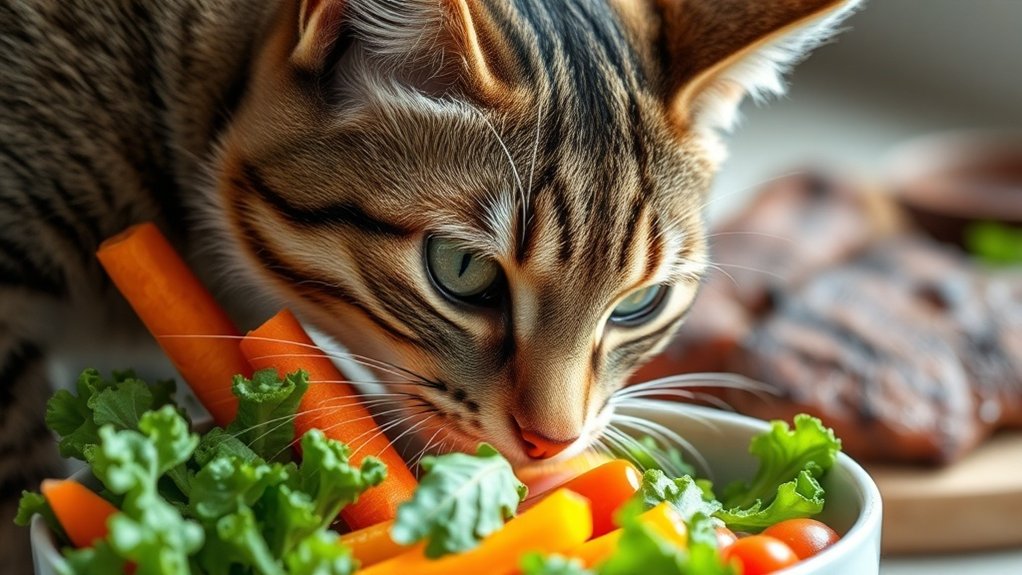
Your cat’s physiology as an obligate carnivore necessitates specific nutrients—including taurine, arachidonic acid, and preformed vitamin A—that exist exclusively in animal tissues.
Plant-based proteins lack the complete amino acid profiles required for feline metabolic processes, and cats possess limited enzymatic capacity to convert plant-derived precursors into biologically active forms.
Without animal-sourced nutrition, your cat will develop critical deficiencies leading to dilated cardiomyopathy, retinal degeneration, and hepatic dysfunction.
Obligate Carnivore Nutritional Requirements
Cats possess distinct metabolic pathways that necessitate animal-derived nutrients, making them obligate carnivores by biological design.
Your cat’s essential nutritional needs depend on animal-based proteins containing taurine, arachidonic acid, and preformed vitamin A—nutrients absent in adequate quantities within plant sources. Taurine deficiency precipitates serious health issues, including dilated cardiomyopathy and retinal degeneration.
Your cat’s digestive system lacks enzymatic capacity to efficiently process plant fibers and carbohydrates, resulting in gastrointestinal upset when exposed to vegetation-heavy diets. Unlike omnivorous species, felines can’t synthesize critical nutrients from plant precursors, requiring direct consumption through a meat-based nutritional profile.
This physiological limitation means vegetarian or vegan feeding practices compromise your cat’s digestive health and overall wellbeing, contradicting their evolutionary adaptation as specialized carnivorous hunters.
Essential Nutrients From Meat
While omnivorous species can convert plant-based precursors into necessary nutrients, your feline’s metabolic machinery lacks the enzymatic pathways required for such biosynthesis.
Cats can’t produce taurine, arachidonic acid, or active vitamin A from plant sources, rendering vegetarian or vegan diet options fundamentally inadequate. As obligate carnivores, they require animal-based proteins containing preformed essential nutrients.
Taurine deficiency precipitates dilated cardiomyopathy and retinal degeneration, while insufficient vitamin A compromises epithelial integrity and immune function.
Your cat’s protein requirements—26-30% of daily caloric intake—exceed those of omnivorous species considerably. Nutritional deficiencies manifest as immunosuppression, skeletal abnormalities in growing kittens, and compromised organ function.
These metabolic constraints aren’t dietary preferences but physiological imperatives, making meat consumption non-negotiable for preventing severe health problems in felines.
Health Risks of Plant-Based Diets for Cats
As obligate carnivores, felines possess physiological constraints that render plant-based diets fundamentally incompatible with their metabolic requirements.
Plant-based diets present severe health risks for cats, primarily through nutritional deficiencies that compromise crucial organ function. Their digestive systems can’t adequately process vegetable fibers, resulting in gastrointestinal upset, including chronic diarrhea and malabsorption syndromes.
Specific vegetables like onions and garlic are toxic to cats, causing hemolytic anemia and potentially irreversible organ damage.
High carbohydrate content in plant-based formulations contributes to obesity and associated metabolic disorders, as cats demonstrate limited carbohydrate tolerance.
Without high-quality protein sources, you’ll deprive your cat of essential nutrients like taurine, which can’t be obtained from plant matter.
Meeting essential nutrient requirements demands animal-derived proteins to maintain cardiac function, vision, and reproductive health.
Veterinary Consensus on Vegan Cat Food
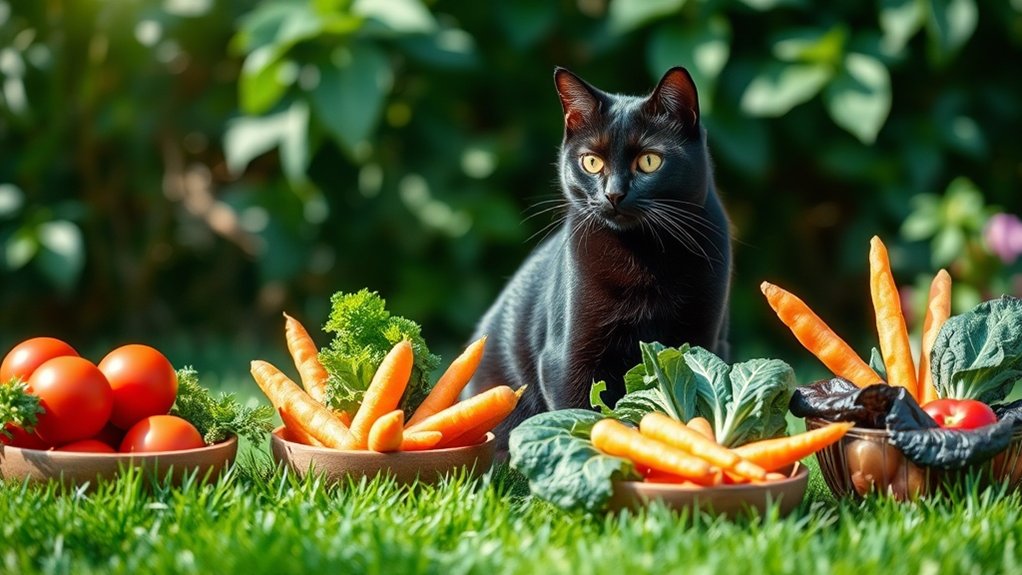
The veterinary medical community maintains a largely unified position against vegan diets for felines, citing extensive research demonstrating incompatibility with species-specific metabolic pathways.
You’ll find that veterinary consensus emphasizes cats’ obligate carnivore status, requiring taurine, arachidonic acid, and preformed vitamin A—nutrients chiefly absent in plant sources.
While some vegetables are suitable as occasional supplements, feeding your cat exclusively plant-based nutrition isn’t considered safe by professional standards.
The Association of American Feed Control Officials confirms that achieving proper nutrient profiles in vegan cat food remains challenging without extensive supplementation.
Cat owners should understand that commercial vegan formulations typically lack adequate essential amino acids and fatty acids.
Despite claimed health benefits, cat’s diet modifications require consultation with veterinary nutritionists, as deficiencies can precipitate cardiac disease, vision loss, and immunological compromise.
Comparing Cats and Dogs: Different Dietary Needs
Understanding the fundamental metabolic distinctions between cats and dogs proves crucial for appropriate species-specific nutrition management.
Cats are obligate carnivores requiring animal-based proteins, while dogs function as omnivores with greater dietary flexibility. The protein requirement for feline nutrition reaches 26-30%, markedly exceeding canine needs of 18-25%.
Cats can’t synthesize taurine and arachidonic acid, necessitating animal tissue consumption, whereas dogs produce these compounds endogenously.
Feline carbohydrate metabolism remains limited compared to canine digestive capabilities. When considering vegetables Cats Can Eat, moderation proves critical since fruits and vegetables aren’t nutritionally required.
High water content produce may support healthy digestive function, but dietary needs fundamentally differ between species. Understanding these physiological distinctions prevents inappropriate cross-species feeding practices and guarantees ideal species-specific nutritional support.
Safe Vegetables Cats Can Eat as Occasional Treats

While feline physiology primarily demands animal-based nutrition, certain vegetables offer supplemental nutritional benefits when incorporated appropriately into their diet. You can safely introduce vegetables as occasional treats for cats when served in small, controlled portions to prevent digestive complications.
Consider these clinically validated options:
- Broccoli: Delivers antioxidants and fiber supporting digestive function. Limit to one-two small bites once-twice weekly.
- Carrots: Provides vitamin A supplementation. Serve cooked or raw in small pieces one-two times weekly to minimize choking risk.
- Green beans: Offers low-calorie, high-fiber nutrition beneficial for weight management. Administer steamed or raw once-twice weekly.
Each vegetable must undergo proper preparation—steaming or cutting into manageable portions—to guarantee safe consumption.
Monitor your cat’s response when introducing these treats, adjusting frequency based on individual tolerance.
Vegetables That Are Toxic to Cats
Although certain vegetables provide nutritional benefits, numerous common varieties contain compounds that pose significant toxicity risks to feline physiology.
Onions, garlic, chives, and leeks—all allium family members—contain sulfur compounds that destroy red blood cells, potentially triggering hemolytic anemia.
Green tomatoes and raw potatoes harbor solanine, an alkaloid causing gastrointestinal issues including vomiting and diarrhea.
Rhubarb presents particularly severe dangers, as its oxalate crystals and oxalic acid directly attack renal function, leading to kidney failure.
Wild mushrooms represent another critical concern, with toxic varieties causing hepatic and renal damage.
You must prevent your cat from accessing these vegetables entirely, as even small quantities can precipitate serious health problems.
If you suspect ingestion of any toxic vegetable, seek immediate veterinary intervention.
Ethical Considerations for Vegan Cat Owners

If you’re a vegan cat owner, you must recognize that cats are obligate carnivores requiring specific animal-derived nutrients like taurine, arachidonic acid, and preformed vitamin A that can’t be adequately synthesized from plant sources.
Feeding your cat a vegan diet without proper supplementation can result in severe deficiencies leading to dilated cardiomyopathy, retinal degeneration, and immunodeficiency.
Before implementing any alternative diet, you’ll need to consult a board-certified veterinary nutritionist to formulate a nutritionally complete plan with appropriate synthetic supplementation and establish monitoring protocols for potential complications.
Cats Are Obligate Carnivores
Cats possess a physiological requirement for nutrients derived exclusively from animal tissues, distinguishing them as obligate carnivores rather than facultative meat-eaters.
You’ll find that essential nutrients critical for their health—including taurine, arachidonic acid, and vitamin A—exist mainly in animal-based proteins. Your cat can’t efficiently synthesize these compounds from plant sources.
Understanding this biological imperative helps you direct ethical considerations when feeding your pet:
- Nutritional deficiencies from plant-based diets cause vision problems, cardiomyopathy, and compromised immunity
- Veterinary nutritionists emphasize species-appropriate diet requirements supersede owner dietary philosophies
- Commercially formulated vegan options require rigorous veterinary oversight and biochemical monitoring
Health issues stemming from inadequate animal protein intake aren’t merely theoretical—they’re clinically documented outcomes.
You’re responsible for prioritizing your cat’s physiological needs over personal ethical frameworks regarding animal consumption.
Health Risks of Veganism
When vegan cat owners implement plant-based feeding regimens, they’re exposing their pets to documented cardiomyopathic pathology and multisystem organ dysfunction.
Your cat’s obligate carnivore physiology requires taurine and other amino acids exclusively available in animal protein sources. Nutritional deficiencies manifest clinically as dilated cardiomyopathy—a potentially fatal condition—alongside immune system compromise and dermatological deterioration.
You’ll observe lethargy, poor coat quality, and increased susceptibility to infections as your cat’s health deteriorates. The AVMA explicitly advises against veganism for feline patients, emphasizing that plant-based diets can’t adequately fulfill species-specific metabolic requirements.
While your ethical considerations regarding animal welfare are valid, you must recognize that imposing dietary restrictions fundamentally compromises your cat’s well-being.
The documented risks of vegan feeding practices create an ethical paradox where protecting one animal directly harms another.
Consulting Veterinary Nutrition Experts
Before implementing any alternative feeding protocol for your feline companion, you must establish a collaborative relationship with a board-certified veterinary nutritionist (ACVN diplomate) who can conduct thorough metabolic assessments and formulate species-appropriate dietary interventions.
Consulting veterinary nutrition experts guarantees your vegan diet addresses essential nutrients like taurine, arginine, and vitamin A.
Your veterinarian will monitor:
- Quarterly health check-ups with extensive bloodwork panels
- Amino acid profiles to prevent cardiomyopathy and retinal degeneration
- Urinary pH levels indicating metabolic complications
Commercial vegan cat foods often lack complete nutrient profiles for your cat’s unique nutritional needs.
A balanced diet requires precise supplementation protocols.
Ethical considerations demand you prioritize feline welfare over dietary philosophy—your plant-based diet choices shouldn’t compromise obligate carnivore physiology.
Professional guidance prevents irreversible deficiencies.
Alternative Solutions for Vegans With Cats
Although philosophical commitments to veganism create ethical dilemmas for cat owners, feline physiology as obligate carnivores necessitates meat-based nutrition for survival.
You’ll need to prioritize high-quality, meat-based food that delivers essential nutrients like taurine, arachidonic acid, and vitamin B12. While some vegan cat food brands offer synthetic alternatives, these require rigorous evaluation for nutritional adequacy.
You can create a balanced diet by consulting veterinary nutrition experts who’ll formulate appropriate supplementation protocols. Safe vegetables like steamed broccoli serve as occasional treats but mustn’t substitute primary protein sources.
Regular health check-ups remain critical for monitoring your cat’s nutritional status, enabling early detection of deficiencies. This evidence-based approach reconciles ethical considerations with your cat’s biological requirements, assuring peak health outcomes while respecting your values.



